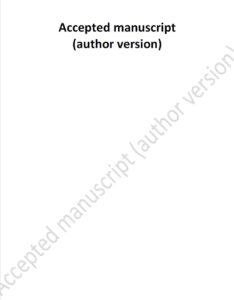Purpose: The present study to investigate the earthworm Eisenia fetida was a chief organism for accumulation of heavy metals (Pb, Cr, and Cd) in their body tissue from sewage sludge with different combinations of animal dung and converted into rich organic vermicompost which plays a beneficial role for environment, animals and human health. Method: Animal […]

Background: The application of biosolid as a fertilizer in agricultural cultivation is a common practice in many countries. This study investigates the effects of sewage sludge and compost usage on soil chemical properties and Zea mays nutrition in comparison with those of iron and manganese sulfate solution. The experiment was carried out in a completely […]
Background: Improving levels of organic matter in desert soils is necessary for their cultivation. A two-year study (2008 to 2010) was conducted on a sandy clay loam soil at the experimental research farm of the Omdurman Islamic University, Sudan to determine the effect of application of crop residue, sewage sludge, and humentos on selected soil […]
Purpose To examine the effects of the application of composted sewage sludge fertilizer (commercially sold as Kala compost) and inorganic (NPK) fertilizers on soil quality and on two crops (radish and beans) irrigated using groundwater and sewage treated wastewater (TWW) for irrigation by measuring heavy metals in the soil and plants and other parameters such […]
Purpose Microbial pathogens can lead to health problems and disease transmission. Present study aimed to evaluate the microbial quality and quantity of vermicompost production and to compare to the current Iranian standards to protect public health and environmental concerns. Method This is a pilot-scale experimental study conducted in the Public Health laboratory of Shahid Sadoughi […]
Purpose Organomineral fertilizers formulated from different organic sources have been studied for the fertilization of several crops. Filter cake is currently one of the most used sources of organic matter; however, sewage sludge also presents characteristics of agronomic interest, being one of the major environmental problems in Brazil. In this sense, the efficiency of pelletized […]
Purpose The overharvesting of the endemic palm tree Euterpe edulis Mart. (Arecaceae) from the Brazilian Atlantic Forest hotspot and the destination given to the sludge produced from urban sewage treatment are both serious environmental issues caused by human activities. In order to find solutions or alternatives for both the issues, we aimed to investigate the […]
Purpose The research was focused on evaluating phytotoxicity of sewage sludge from two selected wastewater treatment plants in Czech Republic. Methods Laboratory experiments were carried out with samples of sewage sludge, which were focused on the evaluation of their phytotoxicity by using the PhytotoxkitTM testing set. Specifically, the inhibitory/stimulating effect was established on the growth […]
Purpose Management of sewage sludge generated from wastewater treatment plants is a big challenge for its potential reusage in agriculture. Most of the Lebanese local sludge is discarded in the water or in landfills (most wastewater plants are partially functional). The objective of this research was to assess the effect of the application of different […]
Purpose The aim of this study was to prove that the Fe-containing by-products (compost, sewage and lime sludge) have potential influence on the correction of Fe deficiency in sunflower and maize. Method The physiological parameters used were the dry matter (DM), the relative chlorophyll content, and the content of photosynthesis pigments (chlorophyll a, chlorophyll b […]